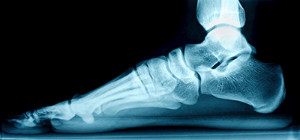
The majority of babies are born with flat feet, and they may remain that way into adulthood. Flat feet are easily noticed as the foot lies flat on the floor while standing, and the lack of an arch may be painful for some patients. Flat feet fall into two categories. Those who have weak muscles in the foot are referred to as having flexible flat feet, and the arch may be seen while lying down. With this condition, the arch will disappear when weight is put on it. Rigid flat feet will remain the same whether standing or lying down, and there may be a reduced range of motion. Many people who have flat feet choose to wear orthotics, which can be successful in treating this type of abnormal foot structure. Severely flat feet may cause difficulty in completing daily activities, and surgery may be considered for permanent relief. If you are an adult who has flat feet, it is suggested that you are under the care of a podiatrist who can guide you toward the relief options and offer the treatment that is best for you.
Flatfoot is a condition many people suffer from. If you have flat feet, contact Afsha Naimat-Shahzad, DPM from Leander Foot & Ankle. Our doctor will treat your foot and ankle needs.
What Are Flat Feet?
Flatfoot is a condition in which the arch of the foot is depressed and the sole of the foot is almost completely in contact with the ground. About 20-30% of the population generally has flat feet because their arches never formed during growth.
Conditions & Problems:
Having flat feet makes it difficult to run or walk because of the stress placed on the ankles.
Alignment – The general alignment of your legs can be disrupted, because the ankles move inward which can cause major discomfort.
Knees – If you have complications with your knees, flat feet can be a contributor to arthritis in that area.
Symptoms
- Pain around the heel or arch area
- Trouble standing on the tip toe
- Swelling around the inside of the ankle
- Flat look to one or both feet
- Having your shoes feel uneven when worn
Treatment
If you are experiencing pain and stress on the foot you may weaken the posterior tibial tendon, which runs around the inside of the ankle.
If you have any questions please feel free to contact our office located in Leander, TX . We offer the newest diagnostic and treatment technologies for all your foot and ankle needs.

